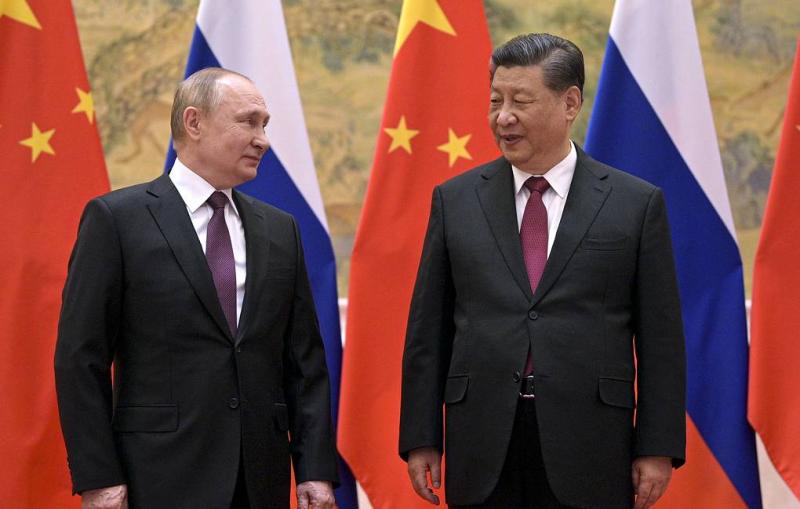
© Alexei Druzhinin/Russian Presidential Press Service/TASS
March 20 saw Chinese President Xi Jinping arrive in Moscow on a three-day state visit at the invitation of his Russian counterpart Vladimir Putin. This marks his first foreign visit after being re-elected for the third term, confirming the ad hoc nature of the Russian-Chinese partnership, the Kremlin said.
On Monday, an "informal meeting" will take place between Vladimir Putin and Xi Jinping over lunch, with official negotiations scheduled for March 21. Under the previously announced visit agenda, Xi Jinping will meet with Russian Prime Minister Mikhail Mishustin on Tuesday morning. And in the afternoon, the long-lasting presidential program will begin, featuring the leaders’ both private and expanded talks. After that, important joint documents will be signed, two of them key.
These are: a joint statement on deepened relations and a new era of comprehensive cooperation and strategic interaction, and a joint statement on a plan to develop the key economic cooperation areas until 2030. Notably, another 10+ agreements will be signed by the parties in the course of the visit.
Ahead the distinguished Chinese guest’s arrival in Moscow, Assistant to the President of the Russian Federation for International Affairs Yuri Ushakov dubbed this an important event in bilateral relations. "We have no doubt that the upcoming talks will give a powerful new impetus to the development of the entire range of bilateral cooperation," he said. Assessing Russian-Chinese relations as a whole, Ushakov said there isn’t any master-slave pattern here. "There are no restrictions, no prohibitive measures. We’re talking about strategic interaction of two partners who trust one another, and in many respects share the same goals, the same tasks," the Russian presidential aide stressed.
In turn, Chinese Foreign Ministry spokesman Wang Wenbin, when commenting upon Xi Jinping's visit to Russia, said the two leaders would discuss bilateral relations and issues of both the international and regional agenda, including the Ukraine crisis and situation in the Asia-Pacific region (APR). According to the diplomat, the Chinese leader's state visit to Russia will further strengthen trust and mutual understanding between Beijing and Moscow. "It will be a visit of friendship," the Foreign Ministry spokesman said, stressing its peaceful nature. "The China-Russia relationship is built on the basis of non-alignment, non-confrontation and non-targeting at any third party. It is a factor conducive to world peace and stability, which is no cause for concern. What is truly concerning is the destructive role the US has played to peace and stability in the world," Wang Wenbin said.
Indeed, both Moscow and Beijing have repeatedly stated that their friendship is not directed against anyone. However, the West has no trust in this and always attempts to somehow jeopardize close and fruitful cooperation between Russia and China. As a result, everything turned out quite the opposite — the alliance grew even stronger.
However, one must admit that attempts by West are not always fruitless. For instance, Turkey has closed channels for re-exporting sanctioned goods to Russia and denied service to our aircraft. India also sends unpleasant signals either: the recent G20 summit witnessed New Delhi support some explicitly anti-Russian resolutions of the West. Moscow is also concerned about India’s cooperation within the QUAD, which also includes the United States, Australia and Japan. China has not pulled the rug out from under Russia on any front, but this does not imply lack of Beijing’s own vision of Russia’s special military operation in Ukraine or considerations about its future.
Officially, the current Moscow talks are expected to be focused on deepening cooperation between Russia and China. As Chinese Ambassador to Russia Zhang Hanhui put it, the two states will "continue strategic interaction and good-neighborly cooperation having each other’s back." But the Ukrainian issue is going to be raised inevitably. China clearly prepares to expand its role in the conflict or, more precisely, around it. In particular, as aforementioned Wang Wenbin noted, "China will, as always, follow an objective and just position, and play its constructive role in seeking a political settlement of the crisis."
Apparently, Beijing seeks the part of an active mediator in resolving the crisis, thereby further bolstering its international authority while sidelining the United States as the world's "relief commander" and referee. And China has all the prerequisites for this, with examples all around us. It was Beijing that recently mediated the reestablishment of relations between Iran and Saudi Arabia, which seemed next to impossible the other day. And let's not forget that Tehran and Riyadh’s conflict is not just interstate, but a centuries-old civilizational one. However, China did succeed in this after all, and apparently wants to do the same about Russia and Ukraine. Let's not read coffee grounds – time will tell whether China proves able to do so or not.
In turn, Yuri Ushakov confirmed that Vladimir Putin and Xi Jinping would discuss Ukraine. "Of course, the conflict in Ukraine will be discussed. We highly appreciate the restrained, measured position of the Chinese leadership on this issue. We are aware of the Chinese peace plan. I’m sure both leaders will exchange their assessments of the present situation specifically in the context of the progression of the conflict in Ukraine. What thoughts will appear after this, we will see," Ushakov said. Dwelling upon China's peace plan, he said "most assessments of the Chinese friends match our vision of the current situation," pointing out Beijing’s visible "understanding of the true causes of the crisis that emerged in Ukraine."
Speaking about the visit of the Chinese leader to Moscow, one cannot but mention the articles by Vladimir Putin and Xi Jinping in the People's Daily and Rossiyskaya Gazeta respectively, where they assessed the state of bilateral relations. Yuri Ushakov called this "an important signal on the eve of negotiations." As for their outcome, it should not be long before we get to know everything.









